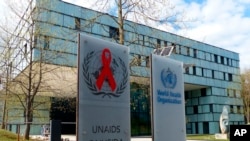The United Nations AIDS program says progress is stalling on ending HIV/AIDS as a public health crisis by 2030 and action is needed to get it back on track.
The UNAIDS program issued its assessment in a new report pointing to recent data that showed 1.5 million people were newly infected with HIV, the virus that causes AIDS. That is over a million more new infections than the global estimate set by the United Nations. The report found that in the span of a year, the AIDS pandemic took one life every minute, around 650,000 deaths.
Mary Mahy, the director for impact with UNAIDS, called those deaths preventable. She notes effective HIV treatment and tools to prevent, detect, and treat opportunistic infections are available but are not provided equitably across the world.
Among those disproportionately affected by new infections, she says, are young women and adolescent girls.
“Adolescent girls and young women are three times as likely to acquire HIV as adolescent boys and young men in sub-Saharan Africa. While men are less likely than women to obtain anti-retroviral therapy or achieve viral suppression, this leads to continued new infections in their female partners,” said Mahy.
The report finds new HIV infections have been rising for several years in eastern Europe and Central Asia, the Middle East, North America, and Latin America. It says new infections are rising in Asia and the Pacific, the world’s most populous region. Officials say the rise is particularly alarming as infections in the region previously had been falling.
Mahy says the picture in sub-Saharan Africa is mixed.
“East and southern Africa, West and Central Africa are still seeing declines,” said Mahy. "But the east and southern Africa decline is slowing down. That rate in which it was dropping before is not as fast as it was before. West and Central Africa have seen a rapid increase in treatment, mostly in Nigeria, which is slowing the epidemic as well in terms of new infections.”
The report says global disruptions, including the COVID-19 pandemic and the war in Ukraine, have slowed many HIV prevention efforts. Those crises, it notes, have created difficulties for many people to access services to receive the lifesaving treatment they need.
The assessment comes ahead of the 24th International AIDS Conference being held in Montreal, Canada and virtually this week. The talks run from July 29th through August 2.




